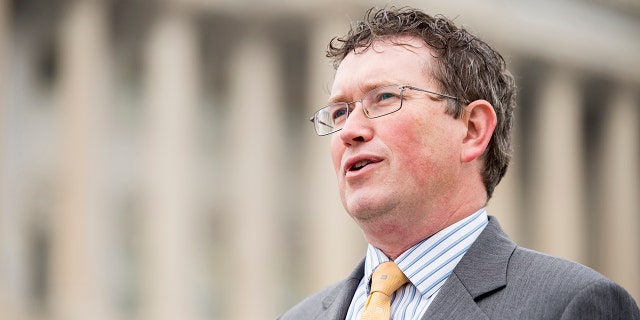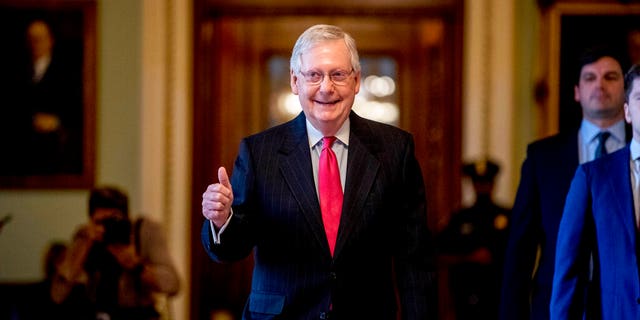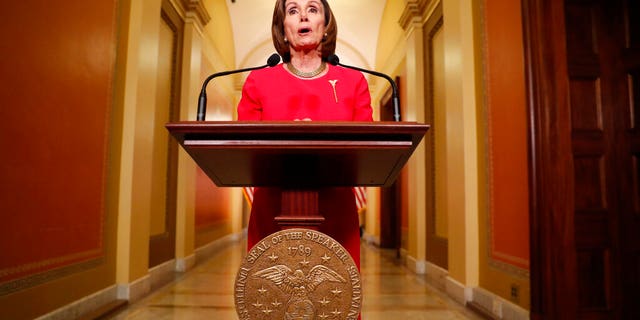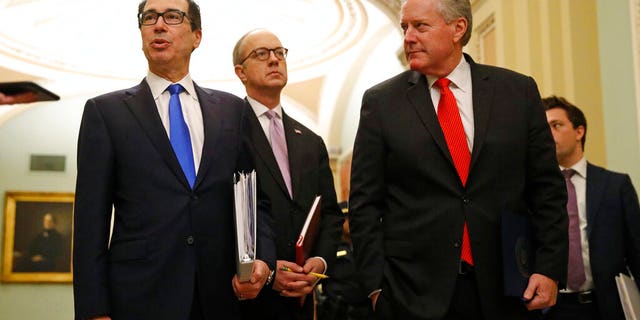Furious lawmakers voiced serious concerns on Capitol Hill late Thursday that a Republican House member could “go rogue” and possibly scuttle a vote on the $2 trillion coronavirus stimulus package, and potentially endanger other House members in the process, Fox News has learned.
Fox News is told there is deep worry on both sides of the aisle that Rep. Thomas Massie, R-Ky., could try to sidetrack House plans to quickly approve the coronavirus bill via a “voice vote” -- a verbal exercise in which those in favor shout yea, and those opposed holler nay. The loudest side would prevail.
“It’s the Thomas Massie show,” said one senior Republican source who asked to not be identified.
“He is going to do it,” a senior Republican leadership source told Fox News, explaining that leadership had tried every type of arm twisting -- and it's not working. The source said he was actively calling members and telling them to get on planes in the morning to come back to Washington, so that a quorum of 216 members could be established if Massie or another member were to demand one.
The source explained that Massie got a very forceful call from a close confidant and member of the House Freedom Caucus urging him to allow the voice vote, but Massie won’t budge. “We have been riding [House Speaker Nancy] Pelosi for stalling things, and now this,” the source lamented.
Asked whether the House leadership was concerned about others besides Massie, another source replied, “There are others who are egging him on.”
“He had better not do that!” screamed one livid senior House Democratic aide into the phone when asked about such a scenario and Massie. “He’s going to make everyone in the building get [coronavirus].”
A senior administration source declined to comment to Fox News when asked if the Trump administration made efforts to curb any potential parliamentary mischief by Massie.
“A lot of members are pi--ed off,” one source said. “If we don’t have a quorum on tomorrow, we’ll definitely have one by Saturday.”
The 880-page coronavirus stimulus package would amount to the largest economic relief bill in the history of the U.S. for individuals, large corporations, and small businesses -- and its unanimous passage in the Senate came despite grave concerns on both sides about whether it involved too much spending, or not enough.
Massie did not respond to multiple requests for comment from Fox News late Thursday. It was unclear exactly why he may want to delay the bill, which some lawmakers have said contains too much wasteful spending -- including $25 million for the John F. Kennedy Center for the Performing Arts in Washington, D.C.

Amid the confusion, House Majority Leader Steny Hoyer, D-Md., distributed a floor schedule late Thursday saying the House will convene at 9 a.m. ET Friday, and there will be two hours of debate. "Members are advised that it is possible this measure will not pass by voice vote," the schedule reads.
"Members are encouraged to follow the guidance of their local and state health officials, however if they are able and willing to be in Washington D.C. by 10:00 a.m. tomorrow, Members are encouraged to do so with caution," Hoyer's schedule continues.
“You might have one grandstander,” President Trump warned at a coronavirus press conference earlier in the day. “It will pass. It will just take a little longer."
Also in the evening Thursday, Fox News spoke to a Republican member who was returning to Washington due to the potential Massie situation. The member expressed shock that there could be delays given that the Senate passed the stimulus bill by a 96-0 unanimous vote.
“I’m coming to D.C. to ensure the bill passes,” the GOP member told Fox News. “It’s frustrating having to be prepared for this scenario. ... I really wish members would put people first and just get this done. Heck, if 100 percent of senators can agree, it’s pretty clear this is going to pass. Only thing a member would be doing is holding it up at great risk to the American people. It’s very troublesome a member of Congress would engage in such a tactic.”
Top Democrats and Republicans have indicated they’d prefer a voice vote because it would not require as many members to return to the Capitol, and would speed a vote along.
However, after the voice vote, any member simply may call for “a recorded vote.” That automatically would trigger the roll call.
That’s where House members insert cards into electronic voting machines and vote either yes, no or present. The House then documents and records the ballot of each member.
"A lot of members are pi--ed off."In the event a roll-call vote were to be needed because Massie demands one, leadership could push to delay the vote until Saturday to give members time to travel back to D.C., according to the two congressional sources.
— Congressional source, concerning the possibility of a delayed vote
The plan for a roll-call vote is to divide the members into 16 groups of 30 members apiece to file into the chamber “to minimize the risks posed by placing too many individuals in one location,” according to an internal security memo obtained by Fox News.
A "State of the Union"-style extreme posture will be in effect on Capitol Hill on Friday, according to the memo, sent by Capitol Attending Physician Dr. Brian Monahan and House Sergeant-at-Arms Paul Irving to all House members ahead of Friday's coronavirus vote.
“A recorded vote could take five or six hours,” even once all necessary members are back in Washington, one House aide complained. That’s because the House would stretch out the vote, according to the memo, having only members enter the chamber to vote in small clusters to contain the coronavirus risk.
Most votes in the House have taken about 20 or so minutes. Votes are sometimes reduced to five or even two minutes if everyone is in the chamber. (The longest vote in House history came on Nov. 23, 2003, and ran 2 hours and 55 minutes. It started at 3 a.m. ET and ended just before 6 a.m. ET on a measure to expand Medicare.)
There could be a deeper problem than the logistics of taking a roll call vote, however. Article I, Section 5 of the Constitution notes that the House and Senate need “a Majority of each shall constitue a Quorum to do Business.”
Massie or any other member could make a point of order -- in which a member asserts that the House or Senate is not operating properly under its own rules -- that the House doesn’t have a quroum. Therefore, the House can't vote if it lacks a quorum. With 430 members, 216 constitutes a quorum.
House Rule XX dictates parameters for establishing quorums in the House of Representatives. Rule XX, Clause 5 (c)(1) deals with the House reducing the number required for a quorum “due to catastrophic circumstances.” But, that rule would eventually trigger the House declaring a number of seats vacant over a period of days, and therefore isn't an option.
In short, the House may have the votes by just a simple majority to pass the coronavirus bill. But if someone makes a point of order about the House lacking a quorum, then leaders will likely have to rustle up 216 members – be that Friday, over the weekend or next week – before the House could vote on the coronavirus bill.
On a conference call with Democrats today, Pelosi, D-Calif., told members the House will vote Friday “if there’s a quorum tomorrow.”
Separately, the security memo also indicated that limited personnel with no extra aides will be permitted at the Capitol. Only one or two persons will be allowed in the elevators at a time, and most will be encouraged to use the stairs, according to the memo.
"Access will be strictly limited to members of Congress, congressional staff who have an office located inside the Capitol and staff who have designated floor access. If a staff person does not have a Capitol office -- even if accompanied by a member -- they will not be permitted inside the Capitol," the memo stated. "Credentialed press will be permitted, as will official business visitors to the House wing."
The document called for members to remain in their offices until voting. The officials are discouraging those “who are ill with respiratory symptoms or fever” from attending.
Officials also are expected to eliminate two of the six lecterns in the House chamber from which members may speak. The officials are asking members to keep away from each other inside the House chamber, and to clean the lectern themselves after they speak.
On a GOP call Thursday afternoon, House Minority Leader Kevin McCarthy, R-Calif., informed Republicans that a GOP member was threatening to request a recorded vote, according to one Republican on the call. The member wasn’t identified.
Democrats are united in favor of a voice vote on the legislation Friday and there was no talk on a caucus call Thursday afternoon that Rep. Alexandria Ocasio-Cortez, D-N.Y., or any other Democrat would try to gum up the process and force a recorded vote, according to a source familiar with the call.
Behind the scenes, Capitol attending physicians, as well as party leaders in the House, have been working to discourage members from coming back to Washington to vote on the package, Fox News has learned.
The not-so-subtle messaging, intended to avoid the unnecessary spread of the contagion, came as the House closed the gym normally available to members.
“That’s to make it as uncomfortable as possible on them,” one source who asked not to be identified told Fox News. “Some of these members practically live out of the gym.”
“Having all of these guys on planes, flying in and then going back spells trouble,” another senior source said.
Fox News is told both sides have been trying to get a head count of how many members may actually show up. One source ventured a guess that it could range from “70 to 150.”
Fox News' Leland Vittert contributed to this report.






















